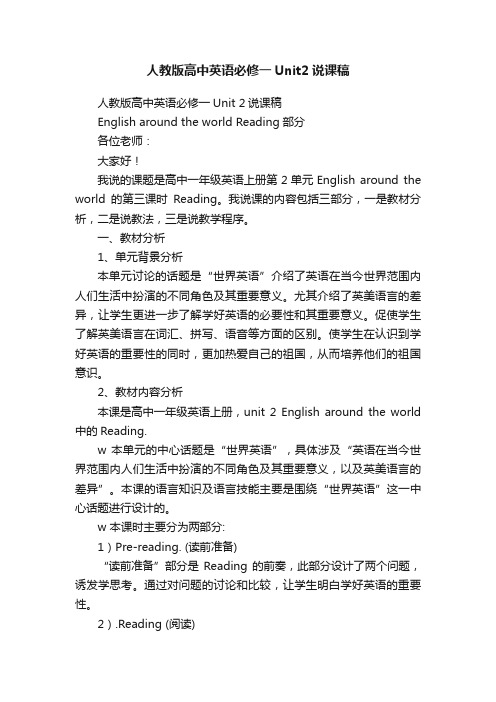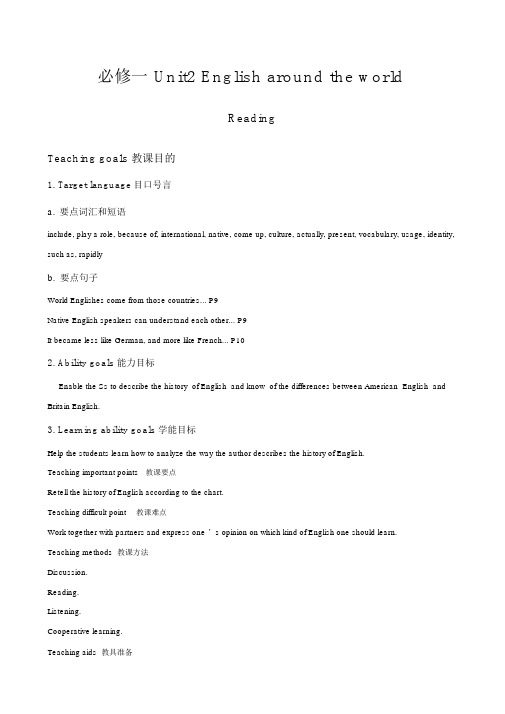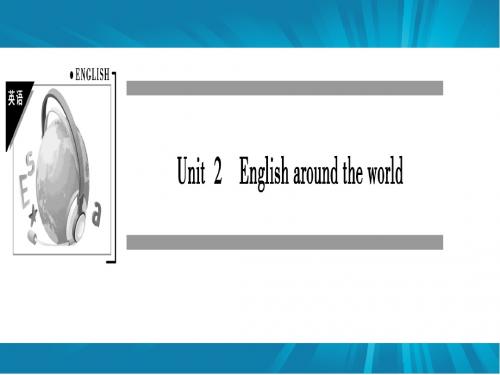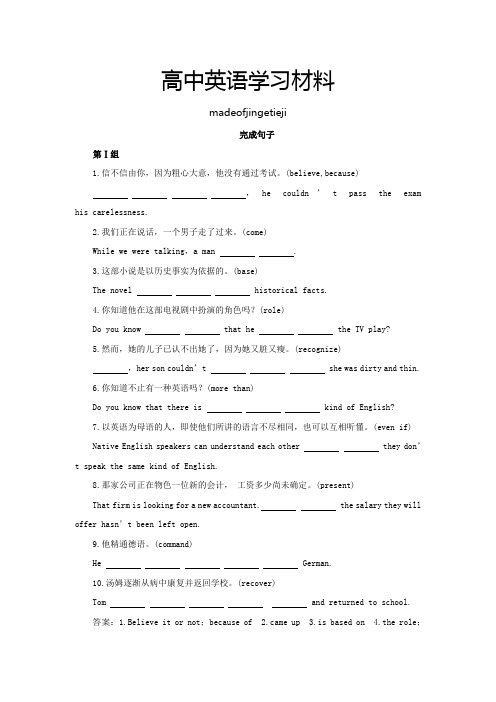2018精品高中英语必修一公开课_unit2_English_around_the_worldppt课件
人教版高中英语必修一 Unit2English around the world

人教版高中英语必修一Unit2English around theworld人教版高中英语必修一Unit2English around the world 的单词和词组练习一、基本词汇:n. :1) elevator 电梯2) gas气体;汽油;煤气;毒气3) apartment(美)公寓4) spelling拼写;拼法5) Singapore新加坡6) lorry(英)卡车7) lightning闪电8) cab出租车9) petrol(英)汽油10)voyage航行;航海11)vocabulary词汇;词汇量;词汇表12)identity本身;本体;身份13)Malaysia马来西亚;马来群岛14)accent口音;腔调;重音15)block街区;块;木块;石块adj. :1) latter较后的;后半的;(两者中)后者的2) African非洲的;非洲人的;非洲语言的3) southeastern东南方的4) Midwestern中西部;有中西部特征的5) eastern东部的;东方的6) northwestern西北方的n./v. :1)base以……为基础;基部;基地;基础2)mand命令;指令;掌握;命令;指挥;支配3)request请求;要求n./adj.:1)native本地人;本国人;本国的;本地的2)Danish丹麦语;丹麦的;丹麦人的;丹麦语的3)Spanish西班牙人;西班牙语;西班牙的;西班牙人的;西班牙语的adj/adv.1) straight直接;挺直;直的;笔直的;正直的二、重点词汇:1) use n&v. 用处;使用 usage n.用法;词语惯用法2) express v.表达 expression n.词语;表达;表情3) recognize v. 辨认出;承认 recognition n.认出;识别;承认4) actually adv. 实际上 actual adj.实际上的5) graadually adv. 逐渐地;逐步地 gradual adj.逐渐的;逐步的6) fulently adv. 流利地 fluency n.流利;流畅 fulent adj.流利的7) frequently adv. 常常;频繁地 frequent adj.频繁的;常见的8) office n. 办公室 official adj.官方的三、重点短语:1) because of… 由于;因为because of和 because的区别:beccause of(后接词组或单词)because (作连词,后跟句子)eg:He was late not only because of his illness but also because he missed the train.不仅因为他的病痛而且因为他误了火车他才迟到的。
人教版高中英语必修一Unit2Englisharoundtheworld整个单元课件

15
Reading–III(5m)
Groupwork: Whatcanyoulearnfromthispassage? (discussingroupoffour,thenaskthestudentsto showtheirideas.)
2.Prepareforthenextclass. 3.FinishtheexercisesonWB.
19
20
Period3Learningaboutl anguage
Unit2Englisharoun dtheworld
21
Period3:幻灯片27-48页
Revision(3m)
Match:(Reivewthenewwords)
sIspoketothemjustnow? Helpthestudentsunderstandwhatisaco mmandorarequest.
27
Learningusefulstructure–II(2m)
Makeclearthedifferencebetweencommandsan drequestsandfinishthefollowingexercises:
apartment
autumn
fall
underground(地铁) subway university(大学) college
rubbish(垃圾) garbage
dustbin(垃圾箱) trashcan
holiday
vacation
fortnight(两星期)twoweeks
12
Reading–I(3m)
&
Unit 2 English around the world-reading-课件 (10)

Elsewhere in Africa and on the Indian subcontinent(次大陆), English is still used as an official language in several countries,even though these countries are independent of British rule.However, English remains very much a second language for most people,used in administration(行政),education and government and as a means of communicating between speakers of different languages.As with most of the Commonwealth(英联邦),British English is the model on which, for instance,Indian English is based.In the Caribbean and especially in Canada,however,historical ties with the UK compete with geographical,cultural and economic (经济的)ties with the USA,so that some aspects (方面)of their English follow British rules and others show US usage.
C
(3)How long did Britain rule India? D A.About 100 years. B.About 50 years. C.About 350 years. D.About 200 years. (4)Who gave American English spelling its own identity? C A.Shakespeare. B.George Washington. C.Noah Webster. D.An English king. (5)Which country may have the largest number of English learners in the world? A A.China.B.Australia. C.India. D.Britain.
人教版高中英语必修一 Unit2 English around the。world 说课稿

人教版高中英语必修一 Unit2 English around the。
world 说课稿Step 2 Pre-reading预读在本课的预环节,我会让学生先阅读课文标题和开头,引导学生思考本文的主题和内容,并提出问题,激发学生的阅读兴趣。
Step 3 While-reading阅读在阅读环节,我会让学生先快速阅读全文,然后再细读,帮助学生理解文中的重点内容和语言表达方式。
同时,我会引导学生掌握一些阅读技巧,如划重点、圈关键词等。
Step 4 Post-reading课文后续在课文后续环节,我会让学生完成一些阅读任务,如完成课文中的填空题、选择题等,帮助学生巩固所学知识,并提高他们的阅读能力。
Step 5 n讨论在讨论环节,我会让学生分组进行小组讨论,就课文中的主题展开讨论,并让学生分享自己的看法和观点,帮助学生提高口语表达能力。
Step 6 Summary总结在课程总结环节,我会让学生回顾本节课的研究内容和收获,并提出一些问题,帮助学生进一步加深对所学知识的理解和掌握。
七.板书设计本节课的板书设计如下:Unit 2 English around the worldXXXEnglish varietiesBritish English vs。
American English八.教学反思通过本节课的教学,我发现学生对于英语在世界上的发展和各种特色英语的了解有了更深入的认识,并且学生的阅读能力和口语表达能力也得到了提高。
同时,我也发现在教学过程中,有些学生仍然存在害羞不愿开口说英语的问题,我会在以后的课堂中继续引导学生多多开口,提高他们的英语口语表达能力。
人教版高中英语必修一Unit2说课稿

人教版高中英语必修一Unit2说课稿人教版高中英语必修一Unit 2说课稿English around the world Reading部分各位老师:大家好!我说的课题是高中一年级英语上册第2单元English around the world的第三课时Reading。
我说课的内容包括三部分,一是教材分析,二是说教法,三是说教学程序。
一、教材分析1、单元背景分析本单元讨论的话题是“世界英语”介绍了英语在当今世界范围内人们生活中扮演的不同角色及其重要意义。
尤其介绍了英美语言的差异,让学生更进一步了解学好英语的必要性和其重要意义。
促使学生了解英美语言在词汇、拼写、语音等方面的区别。
使学生在认识到学好英语的重要性的同时,更加热爱自己的祖国,从而培养他们的祖国意识。
2、教材内容分析本课是高中一年级英语上册,unit 2 English around the world 中的Reading.w 本单元的中心话题是“世界英语”,具体涉及“英语在当今世界范围内人们生活中扮演的不同角色及其重要意义,以及英美语言的差异”。
本课的语言知识及语言技能主要是围绕“世界英语”这一中心话题进行设计的。
w 本课时主要分为两部分:1)Pre-reading. (读前准备)“读前准备”部分是Reading的前奏,此部分设计了两个问题,诱发学思考。
通过对问题的讨论和比较,让学生明白学好英语的重要性。
2).Reading (阅读)“阅读”部分文体为说明文,全文共分三个段落。
全文阐述了一个鲜明的观点:英语的确是当今世界范围内使用最广泛的一门语言之一,也是联合国的工作语言之一,它的重要作用是其他语言不可替代的。
3)Post-reading(读后)“读后”部分共设计了两类题型:第一部分是和个问题,其中前面两个是细节理解题;第三题是一个开放性题目,鼓励学生把英语学习与现实生活相结合。
第二部分是填空形式,帮助学生梳理文章,掌握文章主要细节,概括中心思想,实为文章的一个纲要。
人教版高中英语必修一教案:Unit2EnglandaroundtheworldReading

必修一 Unit2 English around the worldReadingTeaching goals 教课目的1. Target language目口号言a.要点词汇和短语include, play a role, because of, international, native, come up, culture, actually, present, vocabulary, usage, identity, such as, rapidlyb.要点句子World Englishes come from those countries... P9Native English speakers can understand each other... P9It became less like German, and more like French... P102. Ability goals能力目标Enable the Ss to describe the history of English and know of the differences between American English and Britain English.3. Learning ability goals学能目标Help the students learn how to analyze the way the author describes the history of English.Teaching important points教课要点Retell the history of English according to the chart.Teaching difficult point教课难点Work together with partners and express one ’s opinion on which kind of English one should learn.Teaching methods 教课方法Discussion.Reading.Listening.Cooperative learning.Teaching aids 教具准备A recorder, a projector and some slides.Teaching procedures & ways教课过程与方式Step I Greeting and revisionT:Good morning / afternoon, boys and girls! First I will check the words and expressions you have previewed.(P11-12 Discovering useful words and phrases part 1, 2, 3, and 4)Teacher shows answers on the screen.T: Please look at the screen and check your answer. Do you have any question?S: Are“ such as” and“ for example” the same?T: OK, I’ ll give you two examples:1.He knows five languages, such as Russian, French and Spanish.2.The differences in the spoken language are greater.S: Oh, I see. Such“as” is used to list similar things, while“ for example” is used to prove the speakers w Ss ask any questions and Teacher explains to them in class.Step II Warming upArouse the Ss’interests in reading. Let the students know of world English.T:So much for the words. Can you name some countries in which English is spoken?Ss: Of course. America, Britain, Canada, Australia...Teacher writes American, British, Canadian, and Australian on the Bb. Then add English to these words.T:Are these Englishes the same?S:I think they are the same. They are all called English.S:I don’t think so. As I know BE and AE are different in spelling, pronunciation and so on.T:Well, turn to page 9. Read the warming up. Please answer the questions below.Ss: (scanning) There is more than one kind of English.T:Please go on reading and try to tell AE words from BE words below.After reading the students give their answers.T:Who will show your answer?S: I think um,“m in a team, rubber, petrol” are BE words“mom,.And on a team, eraser, gas” are AE words.T:Can you give them a name?Ss: World English.T:Very good.Step III Pre-readingActivate the Ss ’background knowledge of English.T:From Warming up we know many people speak English in the world. How many people speak English andwhy do so many people speak English? Please discuss with your partners and answer the questions.A few minutes later.S:Maybe 1000 million people speak English today. Because many countries were colonies of England so Englishis spoken as a first or second language in many countries.S:We can ’t get the exact number. More and more people begin to learn English because English is theworking language in the United Nations. Everywhere children go to school to learn English.T: Excellent! About 1500 million people speak English as their first, second or foreign language. But they’tdon speak the same kind of English.Step IV ReadingGet the students to know the history of English and help the Ss to form a good habit of reading.Point to the Bb.T: How did different kinds of English come about? Please read the text“ The Road to Modern English”and pick out the answer.Ss read quickly to find the answer.T: Any volunteer to answer the question?S: I will. English has changed over time. All languages change when cultures communicated with one another.T: Any different ideas?Well, you all have the same answer.Task1 Reading and choose correct answers.T:Turn to page 10. Please read the questions and multiple answers first to know what information we should get,and then read the passage to find the answer.S:I will. English has the most speakers now.T:Good. What ’s the answer to the second?S:Languages change when cultures change.T: Right. How do you know?S:I judge it, according to the second sentence in the third paragraph.T:Good. Can you choose the right answer to question 3 ?S:Yes. From AD 450 to1150 English sounds more like German.T:Excellent. What about question 4?S:Around 1600 ’s.T:Very good. The last one? Let ’s answer ittogether. Ss: China.T:You are quite right.Task2 Read and summarize the main idea of each paragraph. Work in groups of four.T:Read the text and tell the main idea of each paragraph. After reading, discuss your answer in groups of four.After a few minutes.T: What ’s the main idea of the first paragraph?S1: The first paragraph tells us that more and more people speak English.S2: I don’hinktt so. It describes the extension of English in the world.T: Right. The first paragraph describes the extensive of English in the world. What is the main idea of paragraph 2?S: It tells us native speakers can understand each other but not everything.Let the Ss give an example to prove this point.T: Can you tell me what the third paragraph is about?S:All languages change when cultures communicate with one another. It’s the key sentence of the last two paragraphs. This paragraph tells the development of English as native language.T:Quite right. What about the last paragraph?S:English is spoken as a foreign or second language in many countries.T:How many parts can we divide the text into ?S:Two parts. The first paragraph is the first part, and paragraph 2, 3 and 4 can be part 2.Task3 Analyze the text.T:Please read the text again to tell the main idea of each part and the function of each paragraph. Afterreading please fill in the chart below.DiscussionS1: The first part describes the history of English in chronological order: 16th century-the next century— today.S2: It describes the development of English from the angle of its extension in region. Look, England—many other countries — more people than before (China).S3: I agree with S2.S4: In part two, the author first raises the fact: English has changed over time. Then analyze how English haschanged into world English.T:Are you ready? Which group would like to fill the chart? Group 1 please writes down the main idea of each part. Group 2 please write the function of paragraph 1and2. Group3, the last two paragraphs. The other students check their answers.Sample chart (slide)Part Paragraph FunctionPart1:12Part2:34Suggested answersPart Paragraph FunctionPart1:The extension of English1Describe the development ofin the world English from the angle of itsextension in region.England— many othercountries—more people thanbefore (China).Part2:English changes when2Raise the fact: English hasits culture communicate with developed into world Englishothers3Describe the development ofEnglish in English speakingcountries.4Describe the development ofEnglish in countries where it isspoken as a foreign or secondlanguage.Step V Post-readingCheck the Ss’understanding of the text, help the Ss deal with new language points.Task Express one’s own opinion. Work in groups of four.T:There are many kinds of English. Which kind of English are we learning?Ss: Both AE and BE.Show questions on the screen and ask a student to read them.T: Please discuss these questions and tell us your answers.1.Do you think it matters what kind of English you learn? Why?2.Why do you think people all over the world want to learn English?3.Will Chinese English become one of the world English?After a few minutes.T:OK, I ’ ll ask some groups to report their opinions. Group 1, can you tell us your opinion?S:Yes. I think we should learn BE because other kinds of English came from it.T:Any different ideas?S: In my opinion, we can learn any kind of English because people can understand each other even if they don’t speak the same kind of English.T: Wonderful! What about the second question?S:With the development of economy, it is necessary for people from different countries to communicate witheach other. So we need a language to be work language, while English is the most widely used language. So people all over the world want to learn English.T:Very good! What ’s your opinion?S:I think because of the wide use of computer, people have to learn English. Computer plays an important partin the popularity of English.T:OK. Question 3.Yes or no ?S:My answer is “ yes ”A . large number of Chinese especially young people are learning English. English is communicating with Chinese culture. There will be Chinese English.T:Only time will tell. Now we know English is spoken in so many countries and it plays an important part in the world. If we learn English well, we can listen to English song, read English novels, travel in English speaking countries comfortably and communicate with foreigners easily. Also, it is of great help not only to our own development but also to the development of our country. The Olympic Games will be held in Beijing. Let’s work hard and welcome its coming.Question timeT:It ’ s time for you to ask any questions or let me explain the sentences that hinder your understanding of the text. Ss ask questions freely.T:Now let ’s deal with some language points. Turn to page 9. Let ’ s look atthe sentence: However, they may not understand everything. This sentence means that sometimes they can understand each other, but sometimes theyhave difficulty understanding each other. The English spoken between about AD 450 and 1150 was very differentfrom the English spoken today. In this sentence,“ spoken between about AD 450 and 1150” and“are used to describe the English.HomeworkRetell the text according to the chart.Finish exercises1, 2, 3 (Using words and expressions) P49-50.。
人教版高一英语必修一课件:Unit2English around the word (共84张PPT)

• [联想发散] command后面跟从句时,从句谓语 用(should+)do/be done,以下动词具有相同的用 法: • 一坚持:insist; • 二命令:order,command; • 三建议:suggest,advise,recommend; • 四要求:demand,request,require,desire; • 再加一个敦促:urge。
我们的老师要求我们对考试做好充分的准备。 ② Don't respond to any e-mails r_e_q_u_e_s_t_in_g___(request)personal information , no matter
11.f_r_eq__u_e_n_t __ adj. 频繁的;
常见的 fr_e_q_u_e_n_t_ly___ adv. 常常;频繁地
12._la_t_t_e_r___ adj. 较后的;后半的;
(两者中)后者的 l_a_te_s_t___adj. 最新的;最近的 la_t_e_r___adv. 后来;adj.以后的 la_t_e_ly___ adv. 近来;最近
③The police commanded the witness to describe what had happened the day before.
→ The police commanded that the witness (s_h_o_u_l_d_)d__es_c_r_i_b_e__what had happened the day before.
3.The doctor said to me,“Come in.” →The doctort_o_ld____met_o_g_o___in.
人教版高中英语必修一高一Unit2《EnglisharoundtheWorld》完成句子

高中英语学习材料madeofjingetieji完成句子第Ⅰ组1.信不信由你,因为粗心大意,他没有通过考试。
(believe,because),he couldn’t pass the exam his carelessness.2.我们正在说话,一个男子走了过来。
(come)While we were talking,a man .3.这部小说是以历史事实为依据的。
(base)The novel historical facts.4.你知道他在这部电视剧中扮演的角色吗?(role)Do you know that he the TV play?5.然而,她的儿子已认不出她了,因为她又脏又瘦。
(recognize),her son couldn’t she was dirty and thin.6.你知道不止有一种英语吗?(more than)Do you know that there is kind of English?7.以英语为母语的人,即使他们所讲的语言不尽相同,也可以互相听懂。
(even if)Native English speakers can understand each other they don’t speak the same kind of English.8.那家公司正在物色一位新的会计,工资多少尚未确定。
(present)That firm is looking for a new accountant. the salary they willoffer hasn’t been left open.9.他精通德语。
(command)He German.10.汤姆逐渐从病中康复并返回学校。
(recover)Tom and returned to school.答案:1.Believe it or not;because of 2.came up 3.is based on 4.the role;played in 5.However;recognize her because 6.more than one 7.even if/though8.At present 9.has a good command of 10.gradually recovered from his illness第Ⅱ组1.当今在中国学英语的人数正在迅速增长。
- 1、下载文档前请自行甄别文档内容的完整性,平台不提供额外的编辑、内容补充、找答案等附加服务。
- 2、"仅部分预览"的文档,不可在线预览部分如存在完整性等问题,可反馈申请退款(可完整预览的文档不适用该条件!)。
- 3、如文档侵犯您的权益,请联系客服反馈,我们会尽快为您处理(人工客服工作时间:9:00-18:30)。
English Around the World
the United Kingdom Ireland
Canada the USA
South Africa
Australia New Zealand
English
Do you think the Englishes spoken all around the world are all the same ?
Wow, I want a tin of Coko, some biscuits and sweets. What about you, Bush?
Well, I want a can of milktea, some candy and some cookies.
Great. I like football match very much.
Because the people who ________ruled England spoke first Danish and later French, English became _________ like German.
less
In the 1600s
Shakespeare ____________ made use of a wider vocabulary than ever before. Some British settlers moved to ___________. America
Do you want to come to my flat? How far is your apartment? It is beautiful
Shall we go to the pub to celebrate your birthday?
Wow, bar is a nice place.
A. 1400’s
B.1150’s
C. 450’s
D. 1600’s
5. Which country has the fastest growing number of English B speakers in the world?_____ A. Australia. B. China. C. India. D.Britain.
Some British people were taken to _________. Australia
In 1620
In the 18th century
pronunciation
Sentence pattern
I like tea while she likes coffee.
……while…… 表对比(而)
Now let’s come to reading
Task 1 Reading and choose correct answers.
1.English has / had the most speakers _______. A. Now
Questions
Which language do you is the most widely used language in the world?
Unit 2
English around the world
公开课
Questions
In which countries is English used as the native language?
Hey, let’s go and see a soccer game. It is very exciting.
Chinese 公寓 酒吧 罐头 糖果 饼干 电梯 比赛 足球 秋天 汽油
British English
American English
flat pub tin sweets biscuit lift match football autumn petrol
centre favourite colour football underground flat
spelling
vocabulary
lift
gas
elevator
petrol
either [i:ðə] dance[dæ ns] not [nat]
either [aiðə] dance [da:ns] not [nɔt]
apartment bar can candy cookie elevator game soccer fall gas
American English
British English
ways of differences
center favorite color soccer subway apartment
D
B. Languages change only after wars.
C. Languages no longer change.
D. Languages change when cultures change.
3. From AD450 to 1150, English sounded more like _____ . C A.French B.Chinese C. Germam D. Russian 4. Shakespear’s English was spoken around ______. D
A
B. when the British ruled many parts of the world
C. In the time of Shakespear D. In the 12th century
2.Which of the following statements is true?______ A. Languages always stay the same.
The road to modern English
AD 450-1150
The English was spoken in England. It was based more on German ______than the English we speak at present.
AD 800-1150
